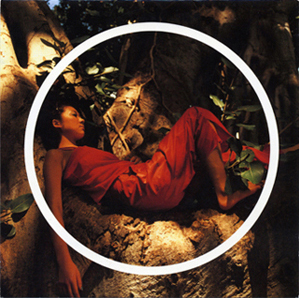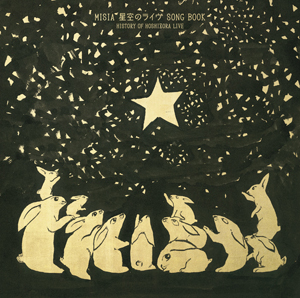
First Love is the debut Japanese-language studio album by Japanese-American recording artist Hikaru Utada, released on March 10, 1999, by Toshiba-EMI.

Misaki Itō commonly known as Misia and stylized in all caps, is a Japanese singer and songwriter. Born in Tsushima, Nagasaki, Misia moved to Fukuoka at the age of 14 to pursue a recording career. There, she continued her secondary education and briefly attended Seinan Gakuin University before withdrawing to focus on her musical career. She was signed to BMG Japan in 1997, after auditioning for record producer Haruo Yoda.

Utada Hikaru Single Collection Vol. 1 is the first compilation album by Hikaru Utada, released on March 31, 2004. It features all A-sides of her hit singles to that date, including 11 number-one hits and all 15 tracks reached the top 5. The album version was remastered by Ted Jensen. The album was released on iTunes in April 2004.

The discography of Japanese R&B singer Misia consists of nine studio albums, three compilation albums, one extended play (EP), one live album, six remix albums, twenty-six singles, twelve promotional singles, eighteen video albums and thirty-seven music videos. In 1997, Misia signed a recording contract with BMG Japan and joined the then up-and-coming talent agency, Rhythmedia. Under the sub-label Arista Japan, Misia released her first single, "Tsutsumikomu Yō ni..." in February 1998, followed by "Hi no Ataru Basho" in May. In June, her debut album, Mother Father Brother Sister, opened at number three on the Oricon chart. The album peaked at number one three weeks later and stayed in the top five for eleven consecutive weeks. Mother Father Brother Sister was certified double million and won a Japan Record Award for Best Album, as well as a Japan Gold Disc Award for Pop Album of the Year. In 2000, Misia's second studio album, Love Is the Message, debuted at number one and was certified double million. It won a Japan Record Award for Best Album and a Japan Gold Disc Award for Pop Album of the Year. The album spawned three top ten hits: "Believe," "Wasurenai Hibi" and "Sweetness." Misia's first remix album, Misia Remix 2000 Little Tokyo, was released three months later and shot to number one. It sold over 800,000 copies and is the second best-selling remix album of all time in Japan.

Mother Father Brother Sister is Misia's debut album, released on June 24, 1998. It debuted at #3 on the weekly albums chart with 330,660 copies sold. The album stayed in the Top 3 the next two weeks and on its fourth week, reached the top of the charts with 277,990 copies sold. The album remained in the Top 5 for eleven consecutive weeks and sold over 2.58 million copies in Japan alone. It won the award for Best Album at the 40th Japan Record Awards.

Marvelous is Misia's third studio album and first self-produced album, released on April 25, 2001. It sold 881,150 copies in its first week, peaked at #1 for two consecutive weeks, and spent five weeks in the Top 5. The first pressing of the album came in sleeve case packaging. Marvelous is the 118th best-selling album of all time in Japan. It came in at #8 on the overall yearly chart, however Marvelous was the second highest selling original album of 2001, behind Hikaru Utada's Distance.

Misia Greatest Hits is Misia's first compilation album and last release with Arista Japan, released on March 3, 2002. It sold 587,210 copies in its first week and peaked at #1 for two consecutive weeks. Misia Greatest Hits was the highest selling compilation album of 2002. It is the 30th best selling compilation album and 90th best selling album overall of all time in Japan. The album includes an enhanced music video for the unreleased track, Amai Koibito, featuring Melonpan.
The discography for the Japanese band Mr. Children consists of 19 studio albums, 5 compilation albums and 38 singles. They are one of the best selling artists in Japan.

Decimo X Aniversario de Misia: The Tour of Misia 2008 Eighth World + The Best DJ Remixes is the fifth remix album by Japanese R&B singer Misia, released June 25, 2008. The release is a two-disc combination of The Tour of Misia 2008 Eighth World DVD and a remixes compilation, The Best DJ Remixes. The Tour of Misia 2008 Eighth World was also simultaneously released as a stand-alone Blu-ray.

Just Ballade is the ninth studio album by Japanese singer Misia. It was released on December 16, 2009 by Ariola Japan, marking Misia's first album release under the label. The album yielded seven singles, "Yes Forever" and "Yakusoku no Tsubasa", released in 2008, the digital exclusive "Sukoshi Zutsu Taisetsu ni", the double A-side single "Ginga" / "Itsumademo", "Aitakute Ima", and lastly "Hoshi no Yō ni...", released on the same day as the album. Just Ballade was certified Gold by the Recording Industry Association of Japan.

Best Selection 2010 is the first Japanese greatest hits album from South Korean pop group Tohoshinki, released in Japan on February 17, 2010, by Rhythm Zone. It contains songs from their albums Heart, Mind and Soul (2006), Five in the Black (2007), T (2008) and The Secret Code (2009). It also features four new singles, two of which are certified platinum by the Recording Industry Association of Japan (RIAJ). Best Selection 2010 is the final album release by the group with its original five-member lineup.

Super Best Records: 15th Celebration is the second greatest hits album by Japanese singer Misia. It was released to commemorate Misia's 15th anniversary as a recording artist by Ariola Japan on February 20, 2013, one day shy of her actual 15th anniversary. The three-disc set was released in Blu-spec CD2 format and each disc was remastered by a different music engineer. The compilation includes four reworked tracks, the singles "Koi wa Owaranai Zutto", "Deepness" and "Back in Love Again", and the new song "Holiday", which was released as a promotional single for the album.

New Morning is the eleventh studio album by Japanese singer Misia. The album was released by Ariola Japan on April 2, 2014, the same day as the 77th and final date of Misia's nationwide Hoshizora no Live VII: 15th Celebration concert tour, at the Bunkamura Orchard Hall, which was broadcast live on YouTube. The album yielded the singles "Shiawase o Forever" and "Boku wa Pegasus Kimi wa Polaris". The lead track "Hope & Dreams" was released as a promotional single for the album.

Love Unlimited∞ is the eighth studio album by Japanese band Dreams Come True. It was released in Japan and throughout Asia on April 1, 1996, through Epic Records Japan, ultimately being their last album released under the label. The record was entirely written by Miwa Yoshida herself, while the composition was handled by her alongside bandmate Masato Nakamura. Much of the recording of Love Unlimited∞ was done in Japan, with additional recording in London and New York City. Material from the album was mastered by Masterdisk. Musically, Love Unlimited∞ is a Pop and R&B album and lyrically focuses on themes of love. The slogan on the obi is, as the title suggests, "Love has no limits."

Love Bebop is the twelfth studio album by Japanese singer Misia. It was released on January 6, 2016, through Ariola Japan. The title, which is synonymous with love freestyle, was inspired by the evolving LGBT movement in Japan, leading Misia to draw a parallel between the growing societal recognition for all forms of love and the various messages of love depicted on the album. On the album's eponymous title track, Misia quotes former American president Barack Obama, who declared "love is love" in a speech given in the aftermath of the Supreme Court of the United States's landmark decision to legalize same-sex marriage nationwide. The album yielded five singles, "Shiroi Kisetsu" / "Sakura Hitohira", "Orphans no Namida" and the digital exclusive double A-side single "Nagareboshi" / "Anata ni Smile :)".

Misia Hoshizora no Live Song Book: History of Hoshizora Live is the second live album by Japanese singer Misia. It compiles live material, spread out over two discs, collected from the Hoshizora Live concert series, recorded from its first installment in 2001 to the most recent in 2015, in commemoration of the series' 15th anniversary. The double album was released on March 9, 2016, through Ariola Japan.

5x20 All the Best!! 1999–2019 is the fifth greatest hits album by Japanese boy band Arashi. It was released through J Storm on June 26, 2019. The album debuted at the top spot of the Oricon Weekly Albums chart, selling 1,304,251 copies in its first week of release in Japan. It spent the most weeks at number one of any album on the Oricon Albums Chart in 2019, with four, and was both the best-selling album of 2019 in Japan, as well as worldwide, with 3.3 million copies sold, eventually becoming the world's best-selling album of the year for 2019.
















